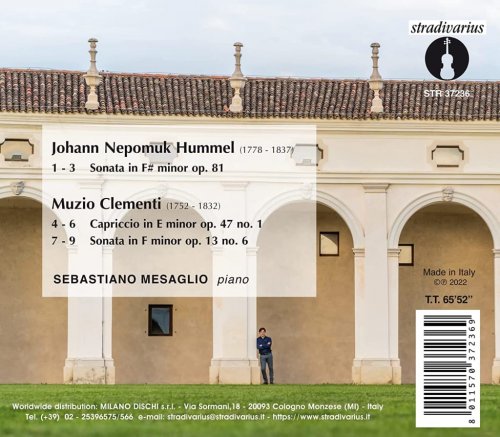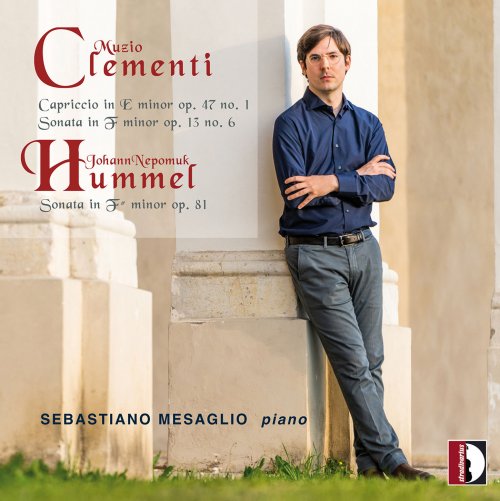
Sebastiano Mesaglio - Clementi & Hummel: Piano Works (2022)
BAND/ARTIST: Sebastiano Mesaglio
- Title: Clementi & Hummel: Piano Works
- Year Of Release: 2022
- Label: Stradivarius
- Genre: Classical Piano
- Quality: flac lossless (tracks) +Booklet
- Total Time: 01:05:55
- Total Size: 192 mb
- WebSite: Album Preview
Tracklist
01. Piano Sonata No. 5 in F-Sharp Minor, Op. 81: I. Allegro
02. Piano Sonata No. 5 in F-Sharp Minor, Op. 81: II. Largo con molt'espressione
03. Piano Sonata No. 5 in F-Sharp Minor, Op. 81: III. Finale. Vivace
04. Capriccio in E Minor, Op. 47 No. 1: I. Adagio - Allegro agitato
05. Capriccio in E Minor, Op. 47 No. 1: II. Adagio sostenuto
06. Capriccio in E Minor, Op. 47 No. 1: III. Allegro vivace - Presto
07. Piano Sonata in F Minor, Op. 13 No. 6: I. Allegro agitato
08. Piano Sonata in F Minor, Op. 13 No. 6: II. Largo e sostenuto
09. Piano Sonata in F Minor, Op. 13 No. 6: III. Presto

Still today, an area of shadow, sorely in need of illumination, continues to surround the piano output of various composers living between the end of the 18th and start of the 19th centuries, indisputable protagonists at the key-board and creators of new aesthetics in the period in which they lived, forgotten with their death and rarely con-sidered by posterity if not within limited and unjust boundaries. They are considered almost unapproachable, even negligible, because of a critical vision incapable of seeing, broadly speaking, beyond the established triads: Haydn, Mozart and Beethoven for Classicism, Chopin, Schumann and Liszt for early Romanticism. Thus, figures such as Cramer, Field, Czerny and Moscheles, who lived between the two centuries, and Hiller, Thal-berg and Henselt, born in the 19th century, are eternally relegated to second place. Above all, however, justice is continued to be denied to Muzio Clementi (1752-1832) and Johann Nepomuk Hummel (1778-1837), who had a direct and not insignificant relationship with the above-mentioned trinities, es-pecially the former, steadfastly holding their own and reciprocating their esteem, apart from certain disagreements seen in some of their letters, and teachers in turn of some of the misunderstood figures mentioned above. In this admirable recording, the pianist Sebastiano Mesaglio, sensitive and zealous re-evaluator of what the history of the piano has passed down to us, offers through an aptly chosen selection of sonatas the chance to gain a clear understanding of what Clementi and Hummel’s contemporaries thought of them, quite rightly, and what we in turn should think.
01. Piano Sonata No. 5 in F-Sharp Minor, Op. 81: I. Allegro
02. Piano Sonata No. 5 in F-Sharp Minor, Op. 81: II. Largo con molt'espressione
03. Piano Sonata No. 5 in F-Sharp Minor, Op. 81: III. Finale. Vivace
04. Capriccio in E Minor, Op. 47 No. 1: I. Adagio - Allegro agitato
05. Capriccio in E Minor, Op. 47 No. 1: II. Adagio sostenuto
06. Capriccio in E Minor, Op. 47 No. 1: III. Allegro vivace - Presto
07. Piano Sonata in F Minor, Op. 13 No. 6: I. Allegro agitato
08. Piano Sonata in F Minor, Op. 13 No. 6: II. Largo e sostenuto
09. Piano Sonata in F Minor, Op. 13 No. 6: III. Presto

Still today, an area of shadow, sorely in need of illumination, continues to surround the piano output of various composers living between the end of the 18th and start of the 19th centuries, indisputable protagonists at the key-board and creators of new aesthetics in the period in which they lived, forgotten with their death and rarely con-sidered by posterity if not within limited and unjust boundaries. They are considered almost unapproachable, even negligible, because of a critical vision incapable of seeing, broadly speaking, beyond the established triads: Haydn, Mozart and Beethoven for Classicism, Chopin, Schumann and Liszt for early Romanticism. Thus, figures such as Cramer, Field, Czerny and Moscheles, who lived between the two centuries, and Hiller, Thal-berg and Henselt, born in the 19th century, are eternally relegated to second place. Above all, however, justice is continued to be denied to Muzio Clementi (1752-1832) and Johann Nepomuk Hummel (1778-1837), who had a direct and not insignificant relationship with the above-mentioned trinities, es-pecially the former, steadfastly holding their own and reciprocating their esteem, apart from certain disagreements seen in some of their letters, and teachers in turn of some of the misunderstood figures mentioned above. In this admirable recording, the pianist Sebastiano Mesaglio, sensitive and zealous re-evaluator of what the history of the piano has passed down to us, offers through an aptly chosen selection of sonatas the chance to gain a clear understanding of what Clementi and Hummel’s contemporaries thought of them, quite rightly, and what we in turn should think.
Year 2022 | Classical | FLAC / APE
As a ISRA.CLOUD's PREMIUM member you will have the following benefits:
- Unlimited high speed downloads
- Download directly without waiting time
- Unlimited parallel downloads
- Support for download accelerators
- No advertising
- Resume broken downloads


